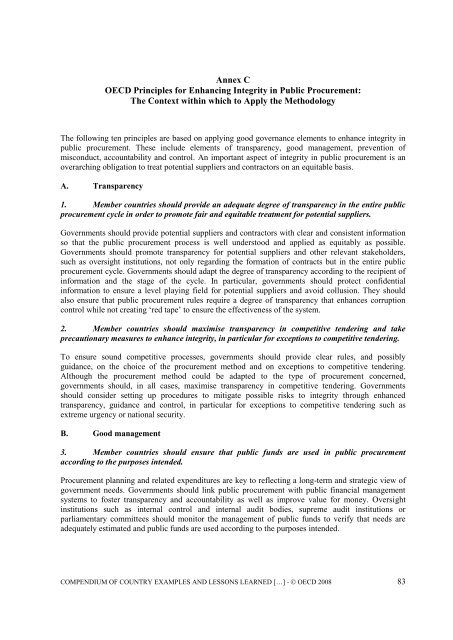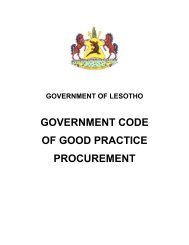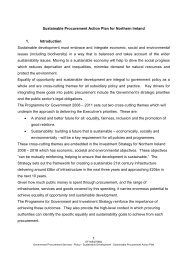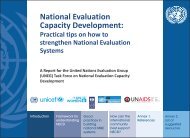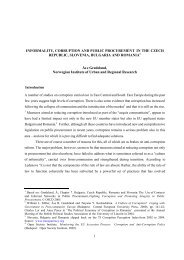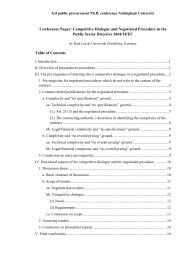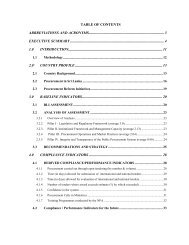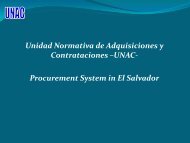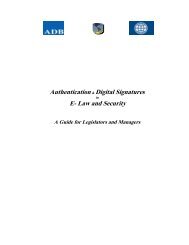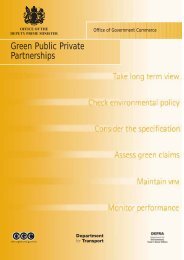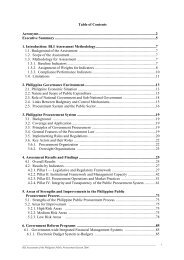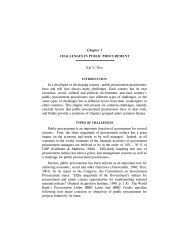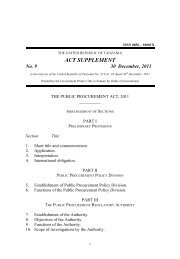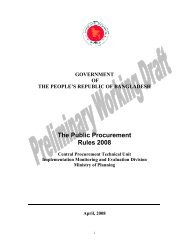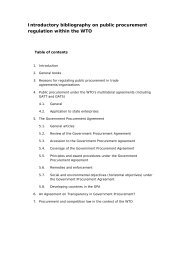Compendium of Country Examples and Lessons Learned from ...
Compendium of Country Examples and Lessons Learned from ...
Compendium of Country Examples and Lessons Learned from ...
You also want an ePaper? Increase the reach of your titles
YUMPU automatically turns print PDFs into web optimized ePapers that Google loves.
Annex COECD Principles for Enhancing Integrity in Public Procurement:The Context within which to Apply the MethodologyThe following ten principles are based on applying good governance elements to enhance integrity inpublic procurement. These include elements <strong>of</strong> transparency, good management, prevention <strong>of</strong>misconduct, accountability <strong>and</strong> control. An important aspect <strong>of</strong> integrity in public procurement is anoverarching obligation to treat potential suppliers <strong>and</strong> contractors on an equitable basis.A. Transparency1. Member countries should provide an adequate degree <strong>of</strong> transparency in the entire publicprocurement cycle in order to promote fair <strong>and</strong> equitable treatment for potential suppliers.Governments should provide potential suppliers <strong>and</strong> contractors with clear <strong>and</strong> consistent informationso that the public procurement process is well understood <strong>and</strong> applied as equitably as possible.Governments should promote transparency for potential suppliers <strong>and</strong> other relevant stakeholders,such as oversight institutions, not only regarding the formation <strong>of</strong> contracts but in the entire publicprocurement cycle. Governments should adapt the degree <strong>of</strong> transparency according to the recipient <strong>of</strong>information <strong>and</strong> the stage <strong>of</strong> the cycle. In particular, governments should protect confidentialinformation to ensure a level playing field for potential suppliers <strong>and</strong> avoid collusion. They shouldalso ensure that public procurement rules require a degree <strong>of</strong> transparency that enhances corruptioncontrol while not creating „red tape‟ to ensure the effectiveness <strong>of</strong> the system.2. Member countries should maximise transparency in competitive tendering <strong>and</strong> takeprecautionary measures to enhance integrity, in particular for exceptions to competitive tendering.To ensure sound competitive processes, governments should provide clear rules, <strong>and</strong> possiblyguidance, on the choice <strong>of</strong> the procurement method <strong>and</strong> on exceptions to competitive tendering.Although the procurement method could be adapted to the type <strong>of</strong> procurement concerned,governments should, in all cases, maximise transparency in competitive tendering. Governmentsshould consider setting up procedures to mitigate possible risks to integrity through enhancedtransparency, guidance <strong>and</strong> control, in particular for exceptions to competitive tendering such asextreme urgency or national security.B. Good management3. Member countries should ensure that public funds are used in public procurementaccording to the purposes intended.Procurement planning <strong>and</strong> related expenditures are key to reflecting a long-term <strong>and</strong> strategic view <strong>of</strong>government needs. Governments should link public procurement with public financial managementsystems to foster transparency <strong>and</strong> accountability as well as improve value for money. Oversightinstitutions such as internal control <strong>and</strong> internal audit bodies, supreme audit institutions orparliamentary committees should monitor the management <strong>of</strong> public funds to verify that needs areadequately estimated <strong>and</strong> public funds are used according to the purposes intended.COMPENDIUM OF COUNTRY EXAMPLES AND LESSONS LEARNED […] - OECD 2008 83


